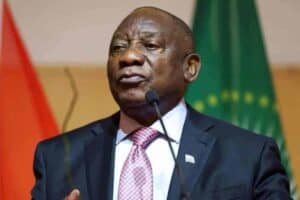Ramaphosa says the governing party should use the provisions of the Constitution more effectively and more directly to drive land reform with greater urgency and purpose.

The governing African National Congress (ANC) is hosting a land summit workshop today to discuss the implementation of the expropriation of land without compensation.
https://twitter.com/MYANC/status/997738531987623936
Speaking at the summit earlier today, ANC and state president Cyril Ramaphosa said the topic of expropriation of land without compensation “has unleashed perhaps the biggest political debate on any issue since 1994”.
Ramaphosa said The Joint Constitutional Review Committee has received over 140,000 submissions on the review of section 25 of the Constitution.
The committee is currently taking in public submissions on the review of section 25 of the Constitution (Property Clause) and other sections where necessary, to make it possible for the state to expropriate land in the public interest without compensation.
Ramaphosa said the number of submissions made to the committee thus far is an indication that the land issue – the expropriation of land without compensation – is important for South Africans.
“It is common cause that the debate that our nation is engaged is about how we should deal with this most important resource – land that was taken from our forebears hundreds of years ago,” the president said.
Ramaphosa said redistribution of land is central to building a united country and overcoming inequality in South Africa.
According to a World Bank report presented to the Minister for Planning, Monitoring and Evaluation Nkosazana Dlamini Zuma last month, South Africa is the most unequal society which has seen inequality deepen since 1994. The report assessed poverty and inequality from 1994 to 2015.
“Without giving the poor the means to productively farm the land, we will not defeat poverty. By addressing the land question we are engaged in an effort to undo a grave historical injustice,” Ramaphosa said.
The president said for the citizenry land is about dignity, identity and security.
“And like all other economic resources in this country, it has historically been employed to serve the interests of a narrow section of society. From the days of colonial conquest, the South African economy has been designed to underperform.
“The country’s assets – its land, its minerals, its human resources, its enterprises – have been owned, controlled and managed in a way that has prevented the extraction of their full value.
“By restricting the ownership of land to the white and the wealthy, and by excluding the black and poor majority, the apartheid regime ensured that one the country’s most valuable economic resources would be severely under-utilised.
“For as long as ownership, control and management are concentrated in the hands of few – and serve the interests of a few – South Africa will not be able to realise the potential of its economic assets,” Ramaphosa said.
Through land reform and redistribution the country’s economic potential would be unlocked, the president said.
“When you return the land to those who were forcibly dispossessed of their land, you unlock its economic value. This will give practical effect to what the African National Congress has committed itself to – radical socio-economic transformation,” Ramaphosa said.
The weaknesses of institutions tasked with carrying out government’s policies on land reform are what the president said has contributed to a lack of progress to the programme, this and inconsistencies in legislation, misguided interventions and a misallocation of resources.
“In its report [by the High Level Panel on the Assessment of Key Legislation and the Acceleration of Fundamental Change chaired by former president Kgalema Motlanthe], the High Level Panel refers, for example, to a ‘total systems failure’ that has prevented effective implementation of legislation to protect the rights of farm dwellers,” Ramaphosa said.
Corruption, mismanagement, dysfunctional community property associations, ongoing evictions of labour tenants, and the inadequate support provided to beneficiaries of land redistribution are challenges the president said the governing party needs to address.
“Our responsibility is to ensure that we have a comprehensive, coherent and sustainable programme for land reform, agrarian reform and spatial inequality.
“It means that we need to explore all options for meaningful restitution, redistribution and tenure reform. There is no one single solution to the land question.
“It requires a range of interventions, addressing a diversity of needs, across a wide range of circumstances, yet all held together by an overarching framework for land reform.”
For more news your way, follow The Citizen on Facebook and Twitter.






